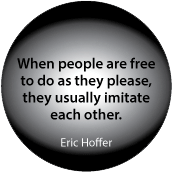The powers that be
Screw you
Then you screw me
I don’t blame you
Do you blame me?
Either weigh
We don’t have
To be that way
An open secret
For awe to see
And not mirrorly be
Everywhere I look
Far and near
Strange and dear
There’s power in me
There’s power in you
It’s up to you
It’s up to me
Much the same
The powers that be
A tempting
To possess awe
But a clue
Of sow sow much
That is
Really
Too due
Eric Hoffer said, “When people are free to do as they please, they usually imitate each other.” While in many situations this may be perfectly acceptable, the evolution of humanity and each human depends upon exercising a judgment that transcends the reactionary forces of an equal and opposite reaction for every action. This judgment, or will, is by its very nature counter-cultural, that is transformative of any given set of cultural conditions, oft referred to as the powers that be. Any set of rules present in any society are not inclusive of our fullest being. It is this fullest being, or perhaps a glimpse or shadow of it, which haunts our highest hopes as part of humanity. The notion of human rights is rooted in this vision. This perpetual journey toward fulfilling our fullest being unites us as actors on the set (a shared reality) of a play defined partly by the powers that be. The more space we carve out in our collective and individual lives for this fuller being the more we act freely, not simply having our lives written for us, and following a script handed to us. Shakespeare’s take on this metaphor outlines the typical stages in which we act, albeit more morose than my own:
“All the world’s a stage,
And all the men and women merely players;
They have their exits and their entrances,
And one man in his time plays many parts,
His acts being seven ages. At first the infant,
Mewling and puking in the nurse’s arms.
Then, the whining school-boy with his satchel
And shining morning face, creeping like snail
Unwillingly to school. And then the lover,
Sighing like furnace, with a woeful ballad
Made to his mistress’ eyebrow. Then, a soldier,
Full of strange oaths, and bearded like the pard,
Jealous in honour, sudden, and quick in quarrel,
Seeking the bubble reputation
Even in the cannon’s mouth. And then, the justice,
In fair round belly, with a good capon lined,
With eyes severe, and beard of formal cut,
Full of wise saws, and modern instances,
And so he plays his part. The sixth age shifts
Into the lean and slippered pantaloon,
With spectacles on nose and pouch on side,
His youthful hose, well saved, a world too wide
For his shrunk shank, and his big manly voice,
Turning again toward childish treble, pipes
And whistles in his sound. Last scene of all,
That ends this strange eventful history,
Is second childishness and mere oblivion,
Sans teeth, sans eyes, sans taste, sans everything.”
from William Shakespeare’s As You Like It, spoken by the melancholy Jaques in Act II, Scene VII
May you find yourself acting freely amidst whatever stage you find yourself, and not mirrorly be made in the image of simply an amassment of whatever reactionary forces operate upon your life.


